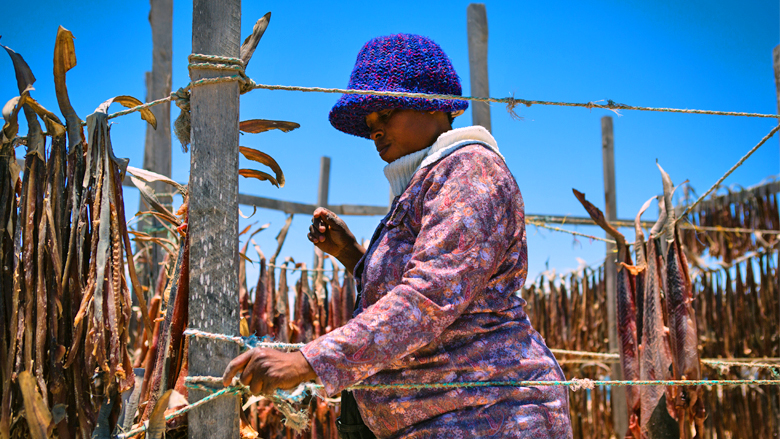WASHINGTON, June 6, 2017—Mauritania’s fishing industry plays a major role in the country’s economy, contributing 25% of public revenue and up to 5% of GDP. The sector generates 53,000 jobs nationwide, with women performing about 30% of the work.
In the northern city of Nouadhibou, many women working in the fishing industry do so out of economic necessity. They work to provide for their families. The . Among the Imraguen tribe, for example, women are renowned for their preparation of poutargue, a type of pickled fish highly sought after in European markets.
Despite their contributions and recognized skills, and are locked out of virtually every segment of the fisheries marketwomen in Mauritania have yet to be fully included in the wider economy and are locked out of virtually every segment of the fisheries market.
“Because women do not fish themselves, they rarely enjoy direct access to the raw material, the fish,” says Alexandre Hugo Laure, a Senior Private Sector Specialist at the World Bank Group. “They play almost no role in the export sector, where you see the highest profits. They are only active in the local market where demand is limited and the highest quality fish are reserved for wholesalers.”
This is particularly difficult for small-scale fish handlers, who say that they are priced out of the market by wealthy wholesalers who supply to the country’s rising number of processing plants.
“We can’t even bargain with the middlemen who sell on to the factories because they know we can’t afford ice or cold storage, so we have a much stricter turnaround time,” says Kouba Taleb, a woman fish handler in Nouadhibou. “So our profits are even lower.”
These challenges are compounded by physical isolation. Nouadhibou’s artisanal market is saturated to the point that women fish sellers have no formal space for their goods and are forced to work outside the market on the street. Exposure to the elements depreciates the value of their product. They often resort to selling their goods in smaller markets near their homes where fewer buyers pay lower prices for their goods.
These poor working conditions, plus limited access to capital, land and equipment, force many women to reduce the number of days they work or to leave the fishing industry altogether.

